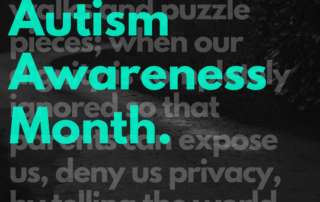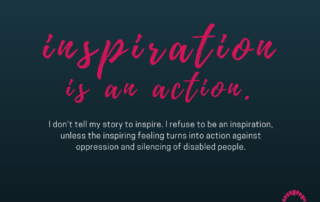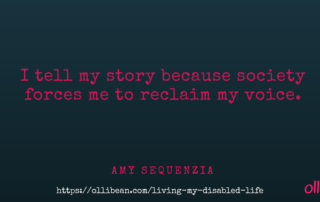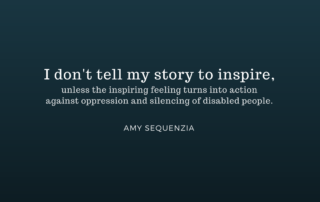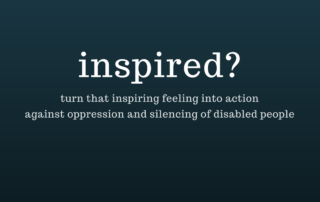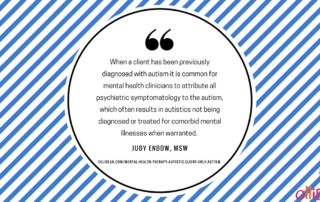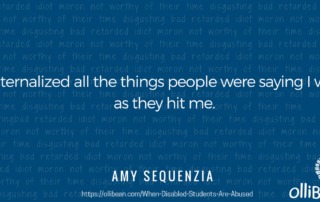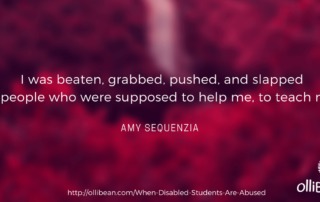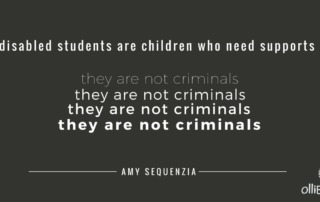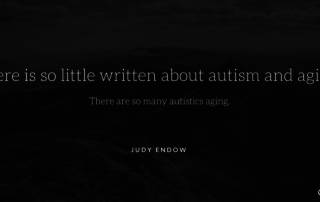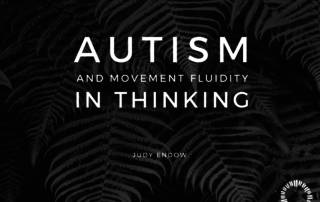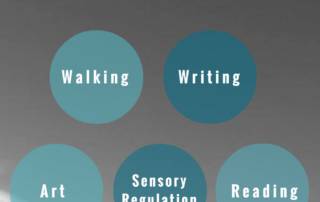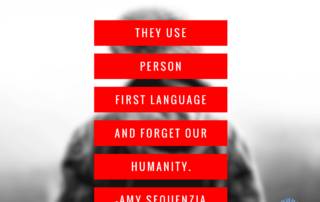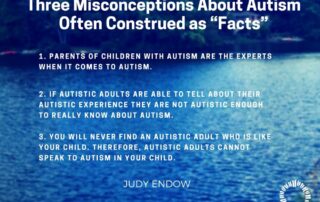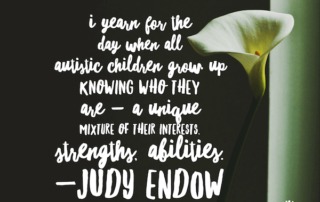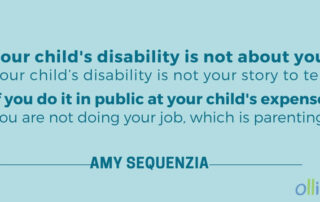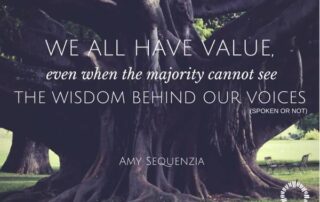Autism Awareness Month Awareness
Beware of Autism Awareness Month by Amy Sequenzia. "Autism Awareness Month" Awareness I am writing this in March because I want everyone to start getting ready for April, which was declared by non-Autistics to be "Autism Awareness Month". I am declaring March: “Autism Awareness Month” Awareness Month. To make it less confusing, let's call March: The Month to Beware of Autism Awareness Month. Why am I doing this? April's Autism Awareness Month Because Autism Awareness Month is the month when all those so-called autism advocacy organizations double, triple down on using our neurology to raise money by advertising how terrible it is
Living My Disabled Life: My Story Is Mine to Tell Part 3
How I Tell My Story by Amy Sequenzia. Living my disabled life: My Story Is Mine to Tell Part 3. (Part 1 Autism: My Story Is Mine to Tell and Part 2 Love, Respect and “Autism Parents” ) By living my life. Unapologetically. Fiercely. With pride. I am me. I am disabled and I am a perfect being, despite the bias and oppression imposed on me. I am a perfect being despite my human flaws. My story is mine. The life I live is the one I have. I like my life. I don’t like what non-disabled people believe my life to
I Resist by Amy Sequenzia
by Amy Sequenzia. I RESIST My resistance is an act of defiance. I defy the assumptions of an unlivable life Of a tragic existence Of dreams that would never become true. The world said I wouldn't - I defied. The world said I couldn't - I defied. The world says that I won't, that I can't - I resist. I defied the expectations, and I kept existing. I defied assumptions, and I celebrate my existence. I resist the ones who insist on erasing my existence. I defy the ones who deny me respect. My existence is an act of
Mental Health Therapy and the Autistic Client: When Clinicians Don’t See the Autism (It’s All the Autism)
When Clinicians Attribute All Psychiatric Symptomatology to the Autism Autistic people find their way to therapy when symptoms of depression, anxiety, OCD and other diagnoses become problematic to them in their daily lives. When a client has been previously diagnosed with autism it is common for mental health clinicians to attribute all psychiatric symptomatology to the autism, which often results in autistics not being diagnosed or treated for comorbid mental illnesses when warranted. As clinicians we need to understand the autistic operating system – in other words, to see the autism – if we are to be helpful to
When Disabled Students Are Abused
This is the second in a series of posts about trauma due to criminalization of disabled students by Amy Sequenzia. Content Warning: ableist slurs, description of abuse. I write this post based on the case linked here, NC Boy With Autism Slapped: Former Teacher Gets Jailtime , and on similar cases that make the news when they happen but after that we don’t hear about the victims. I will tell what happened to me, how I reacted to the abuse, and the lasting trauma that might have gone unnoticed to many. The case in the link had a better ending than most.
Mental Health Therapy and the Autistic Client: When Clinicians Don’t See the Autism
A Series on Mental Health Therapy and the Autistic Client by Judy Endow, MSW When Clinicians Don’t See the Autism (Can’t See the Forest for the Trees) Today, autistic people, just like the population at large, find their way to therapy when symptoms of depression, anxiety, OCD and other diagnoses become problematic to them in their daily lives. As clinicians we need to understand the autistic operating system – in other words, to see the autism – if we are to be helpful to our autistic clients. When we do not have a strong grasp on this the results are
The Criminalization of Disabled Students
This is the first of a series of posts about trauma due to criminalization of disabled students by Amy Sequenzia. The Trauma Is Real Everyone has heard of the school-to-prison pipeline. It is the system that criminalizes students' minor infractions of school rules. It is the result of "zero tolerance" policies, of the presence of cops (School Resource Officers - SRO) in schools. It has become so extreme that a student kicking a trash can, due to frustration, can lead to a criminal record, detention in a juvenile facility and criminal charges instead of a school disciplinary action, like after
Mental Health Therapy and the Autistic Client
By Judy Endow , MSW Mental Health Therapy and the Autistic Client: Establishing Context Background Information: The autism neurology gets hit with elements of confusion, chaos and change as a person goes through their day. How this happens is different for each individual on the spectrum. For example, Brady’s neurology startles to a touch on the arm, DeShawn’s neurology reacts adversely when it perceives a surprise change in the therapy room such as new curtains and Aysia’s neurology delivers a punch when her therapy routine was altered by Grandma bringing her rather than mom. Each of these individuals was abruptly
Toxic Autism Awareness
Toxic autism awareness - sorting out autism fact from autism fiction Judy Endow Autism Fact or Autism Fiction During the past week I have run into two different people in my personal life who have expressed erroneous beliefs about autism. Both people knew that besides being autistic myself, I am a therapist in the field of autism, have written many books and numerous blogs on various autism topics, and consult and speak internationally. Without a doubt, these people knew that I know about autism. And even so, they presumed their comments to be accepted fact so much so that they
The Advantage of Autistic Difference in Visual Perception
Autistic writer, artist and consultant, Judy Endow on autistic difference in visual perception. As a child, people sometimes thought I was stubborn and resistant when I did not want to allow them into my space or to do what they wanted me to do. They did not understand the negative effect they had on me and on my surroundings, and at the time, I did not have the words to explain it. Sensory Information and Perceptions Today I have the words and can explain. I do so in hopes that it might help others who may not yet have their
Autistic Burnout and Aging
Judy Endow Examines the Interplay Between Autistic Burnout and Aging Last week I returned from a vacation that I had been dreaming of taking for several years. I had booked my vacation quite a long time ago. After booking it, my personal resources declined. Many autistics know this phenomenon as autistic burnout. I am beginning to understand that there is likely some interplay between autistic burnout and aging . In autistic burnout we come to the end of our resources that enable us to act as if we are not autistic in order to meet the demands of
Autism and Movement Fluidity in Thinking
Autism and Movement Fluidity in Thinking by Judy Endow Unreliable Fluidity in Thinking One of the hardest things about my autism is the unreliable fluidity of my own thinking. Sometimes my thoughts are fluid and sometimes they are not. When my thoughts are fluid I can easily think through task-oriented things such as making a meal, writing an article, or cleaning the house. I can make a mental (or written) list and follow it. I can think of a main idea and sub topics. I can gather supplies and start. When my thoughts are not fluid life is a bit different.
The Gymnastics of Person First Language
by Amy Sequenzia This post is about Person First Language and autism. Another title for this post could be: "Disability Language, and "Gymnastics". Some might find part of it funny, but I am not kidding. I wrote about why I believe Person First Language (PFL) is ableist, and how individual choices should be respected - the "individual" being the disabled person. Person First Language and Autism Most independent-thinking Autistic adults prefer Identity First Language (IFL). Some use Person First Language and their choice should be respected. This post is directed to non-autistics, to the media, and to autism advocacy organizations
Realities of Being an Autistic Therapist
by Judy Endow Realities of Being an Autistic Therapist In my work as a clinician licensed in my state to provide mental health therapy, many parents of children diagnosed with autism tell me how much they appreciate the fact that I am not only a therapist, but also am autistic. They feel they have a hybrid of sorts – I am a clinician, an autistic and have parented both children with and without autism. In addition, I have been an autism consultant for several school districts over the years so also can appreciate the educational side of things when it
Autism Awareness and Autism Acceptance
No more deficit based Autism Awareness. Autism Acceptance focuses on the strengths and abilities of autistic people.
Autism and Eating Out
Autistic author and consultant, Judy Endow, shares strategies for managing sensory sensitivities when eating out.
Privacy Versus Popularity
Your child's disability is not about you. Your child’s disability is not your story to tell. If you do it in public at your child’s expense, you are not doing your job, which is parenting. - Amy Sequenzia on Ollibean By Amy Sequenzia The title could also be: Privacy of Disabled Children versus Popularity of Parents of Disabled Children. Which one is more important? The answer is clear to me. As I wrote before, a child's disability is not about the parents. Neither is the disability something the child has done to the parents. I know many parents
Assumptions and Ableism
I've recently read an article about how some researches are slowly starting to debunk long held assumptions about autism, Autistics, functioning labels, and how the world needs to provide more appropriate education to “all” Autistics. This is a quote from a researcher (Laurent Mottron): "Early childhood interventions should focus on harnessing strengths, rather than erasing the difference between autistic children and neurotypical kids" Of course, Actually Autistic people have been saying this forever. We have been warning parents about the damages caused by "therapies" that seek to train Autistics to make us look "indistinguishable from our peers” for a long
Autism and Processing Social Information
My autistic neurology means that I am not good at picking up typical social cues, understanding complex social situations, automatically picking up meanings of idioms, or understanding the hidden curriculum that most others automatically pick up (Endow 2012). This means I often look naïve and gullible. The fact is I AM naïve and gullible when I try to use the social constructs of neuromajority folks to navigate the world around me. When I was younger and deemed “in need of help” that “help” largely involved others trying to teach me to think and act as if I had a
Autism and Stubbornness
I am an autistic woman. Most of my life people have let me know they think I am stubborn and controlling. Over time I have learned to hide the behaviors so people do not think I am stubborn and controlling. I understand you view my stubbornness as a bad thing so I have learned to hide it. Today I would like you to consider that what you label as stubborn and controlling is often a solution to help us manage our anxiety and fear. Whenever we have a fearful or anxious moment – and those moments tend to
Autistic Burnout
Each individual who has an autism spectrum diagnosis got that diagnosis based on deficits. That isn’t good or bad, but rather, simply the way diagnosing works. Diagnostic deficits are based on the social and expected norms exhibited by the majority of people. Deficits are determined by a significant deviation from this majority norm. And, if you deviate far enough from the norm you get a label. If you have a group of deficits that line up with the autism spectrum disorder label then you get that label. Once an individual has the autism label, we begin teaching skills to

